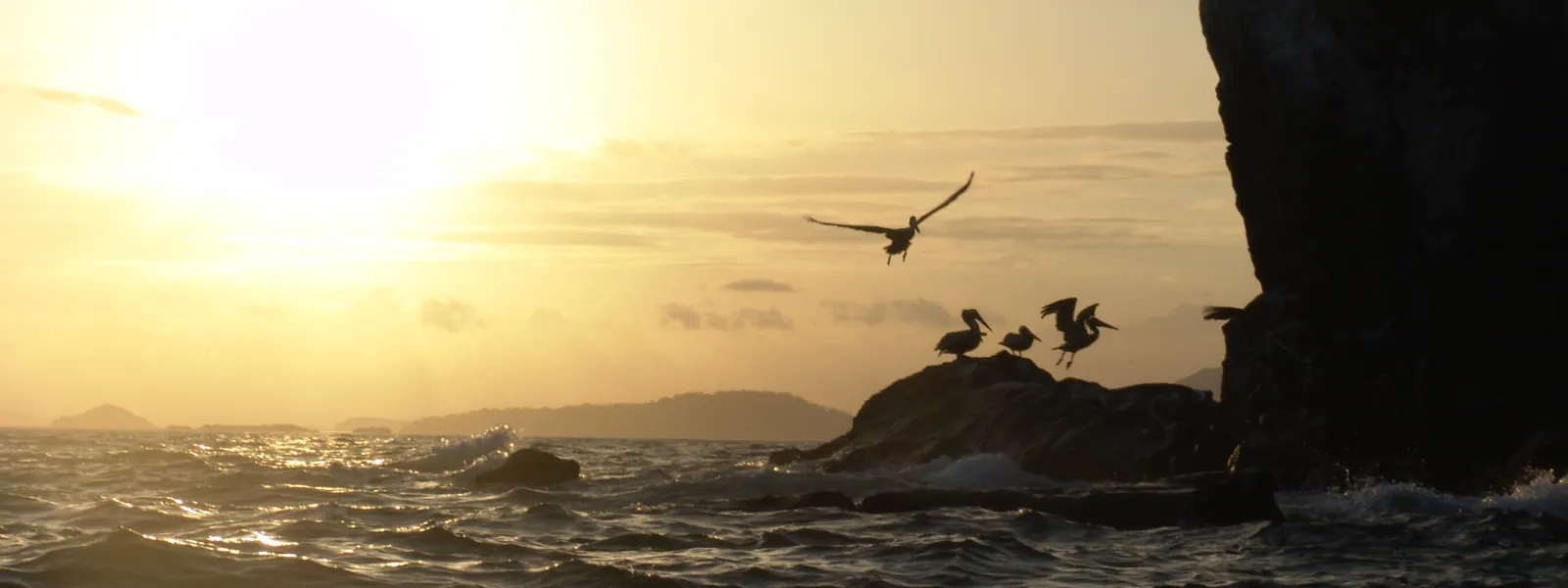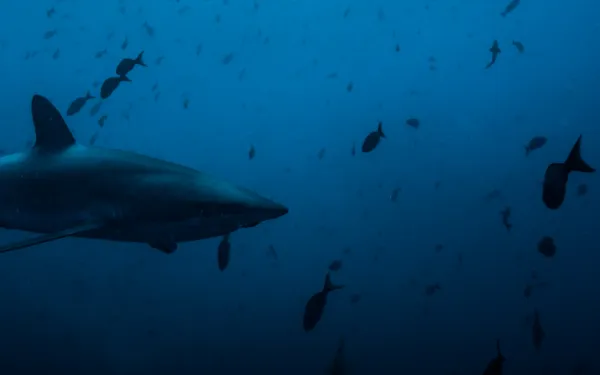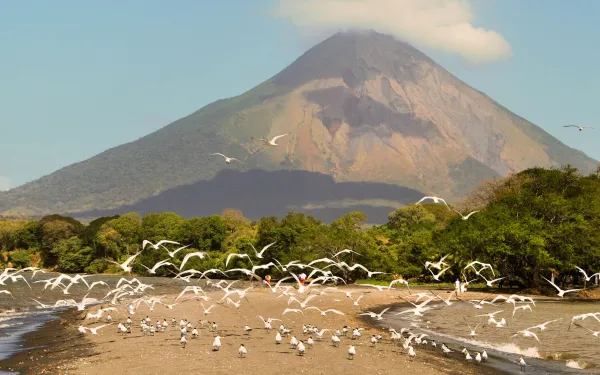
Project
Photo: Alejandro Balaguer / Fundación Albatros MediaVictory: Panama Bay is Legally Protected
Panama Bay, one of the world’s most important nesting and roosting sites for migratory birds, is now permanently protected, thanks in part to AIDA’s expertise in international law.
The bay supports endangered species, including jaguars and loggerhead turtles, as well as the vast majority of the country’s fishing industry. Its coastal mangroves capture 50 times more carbon pollution than a tropical forest of similar size. Mangroves also protect coastal communities from storm surges that grow in severity as the climate warms. Panama has already lost 75 percent of its mangroves.
In 2012 tourism developers had secured a Supreme Court decision overturning the National Environmental Authority’s decision to protect the bay as a wildlife refuge.
AIDA worked with the Environmental Advocacy Center (CIAM), a Panamanian environmental law organization, to defend Panama Bay’s protected status. We submitted a brief containing arguments based on international law. We made analogies between Panama Bay and Las Baulas National Marine Park in Costa Rica. In a legal case about Las Baulas, a balancing test found that the public right to a healthy environment outweighed the interests of tourism developers.
Then, on February 2, 2015—World Wetlands Day—Panama passed a law creating Panama Bay Wetland Wildlife Refuge. The law emphasizes the importance of an ecosystem approach to management and the rational use of wetlands, as described in the Ramsar Convention.
AIDA and CIAM will continue working to see that the law is implemented properly and to ensure the protection of Panama Bay wetlands.
Related projects

Infographic: Advisory Opinion 23
The Inter-American Court of Human Rights, the Observatory of the Inter-American Human Rights System of the UNAM (OSIDH), the Due Process Foundation (DPLF), AIDA and the Institute of Constitutional Studies of the State of Querétaro present this infographic on the Court's Advisory Opinion 23. The main objective is to make available to all interested persons the main points and standards developed by the Court regarding the obligations of States regarding the environment and its relationship with human rights. We hope that this joint initiative will contribute to the full validity and guarantee of economic, social, cultural and environmental rights in the region. Advisory Opinion 23, issued on November 15, 2017, establishes a historical precedent for the protection of human rights in the continent. Download the infographic in Spanish Download the infographic in Portuguese Download the infographic in French Advisory Opinion (full text) English Spanish
Read more
Argentina’s approval of fracking wells violates international obligations
The authorization of four fracking wells within the Vaca Muerta shale deposit poses a risk to vital water sources and violates the rights of Mapuche communities. In support of an amparo filed to invalidate the project’s approval, AIDA presented evidence detailing Argentina’s failure to comply with international environmental and human rights obligations. Mendoza, Argentina. Argentina violated international environmental and human rights obligations when it authorized the development of four fracking wells in indigenous territory. The wells would damage vital water sources and violate the rights of Mapuche communities, AIDA explained in an amicus brief presented before the Supreme Court of Mendoza Province. The brief supports an amparo seeking to invalidate the project’s approval, filed by the Environment and Natural Resources Foundation (FARN, for its initials in Spanish). “Fracking was authorized in Mendoza without any environmental impact assessment,” explained AIDA Attorney Claudia Velarde. “In fact, the project was presented for authorization as ‘infrastructure adaptation’ and the environmental authority granted the permits in a record time of just six days.” The wells are located within Vaca Muerta, the largest non-conventional deposit of shale gas in Latin America. Mapuche indigenous communities—recognized by the National Institute of Indigenous Affairs—live in the project area and, as such, have the right to prior consultation; operators must receive their free, prior and informed consent for any activity affecting their territory. The energy company El Trebol S.A. failed to recognize that right when assessing the project. As a result, the project’s authorization violates Convention 169 of the International Labor Organization, the United Nations Declaration on the Rights of Indigenous Peoples, and the American Declaration on the Rights of Indigenous People—all international standards recognized by Argentina. “The chemicals used in fracking can contaminate both surface and groundwater, including, in this case, those of the Llancanelo lagoon, a wetland of international importance under the Ramsar Convention, a treaty ratified by the government of Argentina,” said Velarde. “The site is a zone of passage and rest for more than 130 species of resident and migratory birds.” In addition, fracking activities require large amounts of water, while Mendoza has for years suffered from drought, a problem only aggravated by climate change. Finally, the brief emphasizes that there is neither detailed geological data of the zone nor quality information on the dynamics of the groundwater. “Faced with this scientific uncertainty, authorities have an obligation to apply the precautionary principle,” Velarde explained. “An activity as potentially harmful as fracking must be rejected unless those seeking to implement it can prove that it will not cause serious and irreversible damage to the environment.” Press contact: Victor Quintanilla (Mexico), AIDA, [email protected], +5215570522107
Read more
Yearning for better times for Nicaragua
Leaving your country behind is an act of courage, especially when you don’t have much. My grandparents were courageous—they fled Nicaragua’s armed conflict in the 1970s, arriving in Costa Rica with nothing but three children in their arms and the hope for a better future. Costa Rica treated them well, and their grandchildren have been able to lead lives of privilege and opportunity. But my grandmother has always dreamed of returning to her country one day. And although I feel proudly Costa Rican, I have learned to love Nicaragua too, especially after getting to know it. Since April, Nicaragua has been in the midst of an armed conflict that has given rise to a large-scale humanitarian crisis. As the conflict continues, the number of people trying to flee Nicaragua has grown, as have requests for asylum in Costa Rica. As of August, more than 300 people had been killed since the conflict began. Unfortunately, the crisis doesn’t seem to be coming to an end anytime soon. Given the urgency of the situation, in May the Inter-American Commission on Human Rights created a Rapid and Integrated Response Coordination Unit with the mission of paying special attention to the human rights situation in Nicaragua. That month, members of the Commission visited cities at the center of the conflict: Managua, Masaya, León and Matagalpa. The resulting report presents evidence of gross human rights violations that have occurred during the country’s social protests. Among those violated were the rights to life, physical integrity, health and medical treatment, freedom of expression and of the press, and freedom of movement. The Nicaraguan State is obligated to guarantee those rights under international law. Thanks to social media, it has been possible to stay informed of what’s been happening in Nicaragua, practically in real time. You can get constant information via Facebook or Twitter by searching the hashtag #SOSNicaragua. The Commission also regularly publishes information on Facebook and Twitter. If you’d like to do something for those affected by the conflict in Nicaragua, you can donate to the Nicaraguan Association for Human Rights or the non-profit organization SOS Human Rights Nicaragua from Costa Rica, which works to support Nicaraguans here in Costa Rica. My grandmother never saw a Nicaragua free of human rights violations. She has always wanted to return to the land where she grew, where her parents were born and where one of her sisters still lives. I hope that everyone who has had to flee Nicaragua during this conflict will be able to return and see their country free, while also fully enjoying their human rights. Hopefully, through democracy, peace will return to that beautiful nation.
Read more